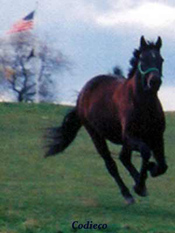
Join the EPN Announcement Only Mailing List
Shop for CD's at CDRush.com & the EPN Benefits!
Put "EPN" in the Coupon Code box when you place your order.
Now you can save money on your favorite music and help the horses at the same time!
EPN Website Sections
Press Stories 1980-2004
Caution Horses For Slaughter
by Heather Chapin-Fowler of the Corral Staff
The Final Roundup Pittsburgh Magazine 5 /2004
Fighting to Stop the Sale & Slaughter of US Horses in Foreign Countries - KDKA TV Investigates 4/30/2004
The Slaughter Question Horse & Rider 12/2002
State Ranks High in Equine Slaughter WTAE's Paul Van Osdol Reports 4/27/2001
Slaughterhouse Ride WISH TV News 8 I-Team Investigative Report 4/2001
Illinois Defeats Horse Slaughterhouse! 1999
Kill Sale Pittsburgh Post Gazette 6/ 1999
Horses To Slaughter
Police, vet check horses' health at New Holland sale
July 1998
PA Horse Transport Legislation - Act 64 of 2001
Horse Transport Bill Passes Unanimously WTAE's Paul Van Osdol Reports 6/21/2001
State Lawmakers Urged to Protect Horses en route to Slaughterhouses
June 1998
State Concerned with Cruelty to Horses Taken for Slaughter
'TRAIL OF TORTURE' ?
June 1998
Horse-Slaughter Industry Critics Pushing Changes
PA. Bill Would Help Protect Horses Headed to Slaughter
March 28, 1998
The goal is a humane trip for horses on the way to be killed for their meat, prized in Europe.
New York Does PA's Dirty Work January 1998
NYSP Stop Double Deck Trailer
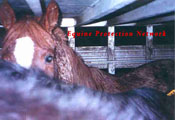
Horses inside double deck cattle trailer stopped by the NYSP. The owner was later convicted & fined $3000.00.
Horse Popsicle Case 1994
Cruel Transport Results in $11,100 Fine
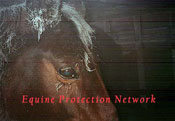
Horses inside double decker covered with frost.
The Last Ride
Eyewitness Account of trip to Slaughterhouse
Overcrowding, negligence plague Shelby horse feedlot
Great Falls Tribune 8/10/2003
The Torture Trail
December 1980
85 horses in trailer, 57 survive
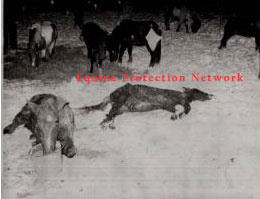
A dead horse lies in the snow, while another too weak to rise eats from a bucket.
The Miracle Mile July 1990
Pregnant Mare Foals Hours After Rescue From Slaughterhouse-
Foal is a Stakes Winner!
 Pasturemate of the Stakes Winner, "On Route 66" who was born only hours after her dam was taken from a slaughterhouse
Pasturemate of the Stakes Winner, "On Route 66" who was born only hours after her dam was taken from a slaughterhouse
PA Dealer Sent to Prison 1999
Shady Horse Dealing
Renaissance Bob 12/ 1998
Rescue of a Racehorse
An Eye For An Eye
Story of Catch-22
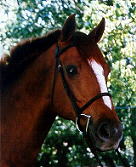
Links
California Voters "Just Say Neigh" to Horse Slaughter!
HoofPAC
Shop online at IGive.com with over 600 great stores you know & love- including Back In the Saddle! Up to 26% of the purchase price is donated to the EPN!
The EPN gets $5 extra the first time you shop!
PayPal accepts credit cards! Please send your tax deductible donation to the:Equine Protection Network, Inc.,
P. O. Box 232, Friedensburg, PA, 17933.
HoofPAC is the political action committee that has been formed to end the slaughter of America's horses. Cathleen Doyle, founder of HoofPAC, led the successful Save The Horses campaign in 1998 that made the slaughter of California's horses a felony.
Did You Know?
"You do the same thing we do with unwanted dogs and cats in this country. If you can afford to own a horse, you can afford to put one down at the end of its days. We'd love for every horse to live in a bucolic pasture until it's 30. That's never going to happen. The reality is that this animal served you and served you hard. He deserves a painless death rather than having a nail slammed in his head, sometimes three or four times until they get it right."
Cathleen Doyle - HoofPAC
Page last revised on:


KILL SALE
Pittsburg Post Gazette
This livestock auction is one stop before slaughter
Sunday, June 06, 1999
By Antoinette Fitch
The sorrel mare stands quietly in the wooden pen. A potential buyer grasps her lips and pulls them apart to inspect her teeth. "Nine- to 11-year-old," the man announces.The mare lifts her front foot on cue for him to inspect her hooves. They are overgrown, badly in need of farrier care. He pats her copper-colored side."Nice horse," he says as he walks away. Three other horses share the 12- by 24-foot pen with the mare. Above, on a catwalk, a group of men also study the horses, animals whose lives are at stake.
It is a recent Thursday afternoon at Pennsylvania Livestock Auction in Waynesburg, and the weekly sale is beginning. In the auction arena next to the livestock pens, produce, farm supplies and rabbits are being sold. About 150 people, local farmers, families seeking 4-H projects and pets and livestock dealers fill the semi-circular auditorium watching the center ring. There the auctioneer, Joe Friend Jr. of Friendsville, Md., has gavel in hand and calls out the bids.
Meanwhile, horses, cattle, sheep, goats and pigs are unloaded from the stock trailers, many of which bear West Virginia license plates. Auction workers herd the animals into pens with whips and orange plastic paddles filled with beads. When the animals are uncooperative, the handlers strike them. The animal noises, chant of the auctioneer and drone of hundreds of conversations blending together are punctuated with shouts from handlers dealing with fractious stock and the clanging of large hooves and bodies against the metal trailer walls.
Five more horses are herded into the pen with the mare. The crowded horses pin their ears at the newcomers. Soon the horses begin to fight, biting and kicking each other The animals are left alone, and none of the auction staff intervenes.
A pen of ponies and burros is next to the horses and at the far side of the pens eight other horses stand tied to the sides of their corral. An anxious quarter horse stallion paces, whinnying and snorting nervously there.
At 1:30, the horses go on sale. The sorrel mare is herded onto scales, then into the auction ring. She willingly follows the handler, needing no prodding. The bidding starts and climbs quickly for the 1,000-pound mare. She sells for $65 a hundredweight -- or 65 cents a pound -- to Fisher Sales Stables in McVeytown, Mifflin County. She is lucky. The buyer plans to sell her as a riding horse. But if no buyer is found, she will be taken to the New Holland auction in Lancaster County then shipped to a Canadian processing plant for slaughter.
It is a fate of many horses from race tracks, private homes and breeding farms in Pennsylvania. Horse dealers normally will not disclose their intent, though most prefer to sell them for recreational use.
"This is a kill sale,"explains Joe Friend Sr., who has owned and operated the Pennsylvania Livestock Auction with his family for 25 years.
"The animals sold here are intended for slaughter. If someone wishes to use them for other purposes, that is their choice."
An average of 28 horses, ponies and burros are sold each week at this auction. Some are sold by the head price, some by the pound. How the horse is auctioned makes little difference to dealers, who only want to resell an animal at a profit.. The horses range between $21.65 and $65 a hundredweight. The Pennsylvania Livestock Auction is one of the few auctions marketing horses that reports sales according to weight instead of individual price.
Although many Americans cringe at the thought, export of horse meat to European consumers is big business and rivals the beef and pork industries.According to statistics published in the May 16 Federal Register by the U.S. Department of Agriculture, in 1996 the United States exported 38 million pounds of horse, burro, and mule meat at a value of $64 million. Belgium and France are the biggest customers, buying 76 percent of the meat. From 1995 through 1997, an average of 100,467 horses were slaughtered annually in four federally inspected U.S. slaughtering facilities.
Horses destined for slaughter in the Northeast are shipped to a facility in Massueville, Quebec. About 26,000 live horses were shipped to that and three other Canadian plants in 1996.
"The value of horses would plummet without the meat market,"
says horse dealer Ron Andio of Youngstown, Ohio, who attends the auction almost weekly. He, like representatives of Fisher Sales Stables, travels from auction to auction, buying and selling. He purchases between 40 and 50 horses weekly. Those not suitable as riding, working or pleasure horses are sold for slaughter. Andio deals directly with the Massueville slaughter plant.
"It culls the sick, lame, unmanageable and poorly conditioned horses," he says.
But a grassroots organization in the Reading area thinks there is a better way.
"Americans aren't eating horses. It's a cultural thing. To most Americans, horses are animals we have trained for our use and pleasure. They give us their all at the races, in the Olympics, on the farm, and so many other places. To send these animals to a slaughter house is a betrayal,"
says Christine Berry of Friedensburg, Schuylkill County, a volunteer with the Equine Placement Network.
"There are a lot of sick or injured horses that need to be put down, but they don't need to be sent through auction after auction where everybody profits --the dealer, buyer, auction and slaughter house."
According to Berry, the horses are slaughtered in much the same way as cattle. A nail gun punctures the skull and brain, either killing or stunning the animal. The horse is then hoisted by its back leg and the throat is cut to drain the blood from the meat.
"It is not a fitting end for such magnificent animals,"
she says.
"It is an emotional issue,"says Bruce Rappoport, president of the Pennsylvania Equine Council. The council is a statewide membership organization of people involved in the horse industry, backyard horse owners and breeders.
Rappoport maintains the sale of horses for slaughter sets the price for all horses on the market. It is a pricing tool upon which the horse industry relies. The two groups of horse enthusiasts are on opposite sides of the fence on several issues. Although it is a newly organized group, the Equine Placement Network has been very active advocating for better treatment of horses sold at livestock auctions. Frequently, horse dealers will take animals to several auctions trying to get the best profit on the horse. The network maintains that practice is stressful on the horse. But Rappoport says there is little difference between horses sold through numerous auctions and show horses traveling the circuit.
"The horse is [taken by trailer] to a sale, shown in front of a crowd, then gets on a trailer to go somewhere else. If it is done responsibly, I don't see a problem."The Equine Placement Network successfully has pressed the Pennsylvania Department of Agriculture, state police and local humane societies to enforce transport, animal health, and humane laws at the auctions in New Holland and Middleburg, Luzerne County. Pennsylvania law requires that all horses brought into the state must have health papers certifying the animals' fitness. It must include a test showing the horse is not a carrier of equine infectious anemia. According to Dr. Bruce Schmucker, Pennsylvania Department of Agriculture veterinarian, the department will become more aggressive in regulating health certification of out-of-state horses at sales.
"We just hadn't given it a high priority in the past and we have been criticized for it," Schmucker says.
The network also has been a proponent for more stringent legislation regulating how horses are transported. Regulations governing horse transport are being reviewed on the federal and state levels. The USDA is seeking public comments until July 19 on commercial transportation regulations of horses going to slaughter. Those proposed rules would ban the use of double-deck livestock trailers in five years. It is legislation the network says legalizes poor transport practices and does little to improve conditions for horses.
The Pennsylvania House Judiciary Committee is reviewing more stringent legislation that would regulate the transport of all horses within the state. The Pennsylvania Equine Council is opposed to the state legislation in its current form. The council fears the laws would be too restrictive for many horse owners.
"We don't argue against the issue of humane transport or humane handling,"Rappoport says.
The pending changes in horse transportation would have little effect on horse dealers attending the livestock auction in Waynesburg. None use double-deck trailers and most take the horses back to farms no more than a six-hour drive from the sale.
According to Andio, the horse market fluctuates with seasonal trends. Now The demand is for riding horses to supply summer youth activities and camps. At the end of the summer, those horses again will change hands and go through the auction circuit again. Andio says there are no criteria to determine whether a horse is sold to slaughter. It is driven by market demand and price of the horse as a commodity, whether for recreation or consumption vs. the cost of maintenance. He did not disclose how many animals he took to slaughter last year. During each auction cycle, some horses will always be sold for kill.
"The reality is that horses are livestock," Rappoport says. "While no one I know in the equine industry wants to have a horse sold for slaughter, we recognize they are not dogs and cats. The equine industry is part of the agricultural industry."Equine Protection Network Comments
On the subject of horses as livestock here are some questions:
If as Bruce Rappoport states, "The equine industry is part of the agricultural industry.", then why do horse breeders, horse owners, horse boarding facilities etc have to pay PA state sales tax on feed and associated products for our horses?
The PA horse racing industry was given the exemption from PA state sales tax in 1996.
Why were horses specifically excluded from the PA drought relief package of 1999?
If horses are livestock and horses are part of PA's agricultural industry, then why are horse owners being excluded from these economic benefits that owners and breeders of other livestock are entitled to ???
The EPN is not suggesting that the classification of horses as livestock be changed, we are just asking why as livestock horses do not reap _all_ the benefits....
Save America's Horses!
|
Please send your tax deductible donation to: Equine Protection Network, Inc., P. O. Box 232, Friedensburg, PA, 17933 |
|
The official registration and financial information of the Equine Protection Network, Inc., may be obtained from the PA Department of State by calling toll free within PA, 1-800-732-0999. Registration does not imply endorsement. |
|
Photos On This Page CANNOT be Used Without Written Permission
|
